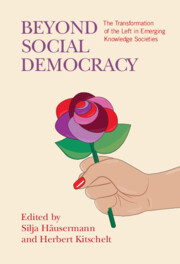Acknowledgments
The possibility of forming strong and lasting ties of intellectual exchange and inspiration over time and across generations of scholars is one of the main perks of academic work and life. Initiating this project and shepherding it through the twists and turns of a truly collective endeavor, involving scholars from different countries, traditions, and generations, has been a tremendous privilege and source of joy for us. The project gained motivation and inspiration from many sources, three of which we want to mention here.
First, from the very start – at the Annual American Political Science Association meeting in 2019, where we were struck by the consistency of the findings on patterns of voter transitions – our goal was to answer a joint set of questions about the transformation of the left in emerging knowledge societies through the integrated empirical analysis of different types of data. Going beyond individual studies and articles seems of increasing importance to us, in order to further the cumulative progress of knowledge in our discipline. Joint projects, such as the one presented in this volume, can be a venue where this cumulative progress of knowledge can and should take place. Second, the project very consciously involved different generations of scholars, in particular many younger scholars. This tight network of intergenerational exchange allowed us to assess current transformations with novel data and methods, while avoiding reinventing the wheel. Third, the project had a strong outreach dimension all along. We worked in particular with the Friedrich Ebert Foundation in Berlin to reflect on our research questions and hypotheses, share and discuss our findings, and better understand the political, internal debates within the left, as well as their inside perception of the strategic dilemmas they are facing. At the Friedrich Ebert Foundation, Katharina Hofmann de Moura was a very important outreach partner, facilitating reciprocal benefit for researchers and practitioners alike. This collaboration also allowed us to publish three International Policy Analysis strategy papers with the Foundation in early 2021, which reached large audiences and allowed us to discuss our findings with many interested audiences in different countries. This exchange has been both instructive and rewarding for us.
In providing the initial impulse to embark on this project, we are indebted to a colleague and friend, Zeynep Somer-Topcu, who then became a collaborator in this project. In July 2018, in her capacity as an organizer of the Political Parties Section of the 2019 meeting of the Southern Political Science Association, Zeynep approached one of us, Herbert, with the idea of organizing a panel on the occasion of the twenty-fifth anniversary of the publication of The Transformation of European Social Democracy (Kitschelt 1994). While we ultimately could not get this panel under way in time, it got us thinking about what then evolved into the initial 2019 Annual American Political Science Association panel on the project that has now resulted in this book.
We owe gratitude not only to all the contributors of this volume but also to a large number of scholars who generously commented on drafts of our framework and/or individual chapters, or even commented on the final manuscript. In particular, we wish to thank James Adams, Nicole Bolleyer, Brian Burgoon, Charlotte Cavaillé, Ruth Dassonneville, Laurenz Ennser-Jedenastik, Geoffrey Evans, Peter A. Hall, Sophie Hill, Simon Hix, Sarah de Lange, Gary Marks, Wolfgang Merkel, Kimberly Morgan, Jonas Pontusson, Line Rennwald, David Rueda, Hanna Schwander, and Bruno Palier. Individual chapters of this book have been presented in many more workshops and various seminars, and we thank all discussants, commentators, and audience participants for their valuable input.
Elena Püntener and Jimmy O’Hare provided invaluable help finalizing all material. At Cambridge University Press, we particularly wish to thank John Haslam and the anonymous reviewers of the manuscript for their enthusiastic support of the project. We also thank Carrie Parkinson, Claire Sissen, and Veena Ramakrishnan at the press for their support in shepherding the project to and through production.
Financially, we gratefully acknowledge support from the University of Zurich and Duke University – in particular, for organizing the workshop conferences and for providing support to make this book freely accessible to all interested readers.



